Film Name:狗十三 / Einstein & Einstein
Our youth may not have known early love, fights, or abortions—maybe not even mischief, arguments, or backtalk—but it certainly knew disappointment, injustice, helplessness, and loneliness. Then, through the pain of growing up, we slowly matured…
Cao Baoping was spot on: “Einstein & Einstein” is a film that stands the test of time, even after five years in storage. With a silent “fucking bitch,” it strips away the audience’s defenses and pierces a wound that will never fully heal—this is the coming-of-age story that belongs to every one of us.
[Note: The following contains spoilers, but they do not diminish the film’s inherent value.]
Within the first ten minutes of the film, the protagonist Li Wan’s background and upbringing are laid out fairly clearly: her parents divorced, she lives with her grandparents, her stepmother gave birth to a son, and the entire family concealed the birth of her younger brother from her for various reasons. Now in middle school, she wanted to enroll in her favorite physics enrichment class, but due to “academic performance concerns,” her teacher and father forced her to switch to English instead. Her father tried to placate her with money, but to no avail. leaving her trapped in a state of pent-up frustration…
The themes of son preference, single-parent households, paternal authority, and generational gaps have already surfaced—yet the story has only just begun.
01

To cheer up his daughter, the father bought a dog as a gift. Li Wan, unable to resist her inner affection for the puppy, quickly accepted it and named it “Einstein”… Little did she know that it was precisely because of Einstein that the fragile protective layer around her would be shattered in an instant.
When Grandpa accidentally lost the dog, the family didn’t focus on finding it but on how to make Li Wan accept the loss as calmly as possible—to them, the dog was merely a child’s toy, not a family member. From the start, they weren’t on the same wavelength, and Li Wan gradually realized that “her world wasn’t the whole world.”
Don’t misunderstand—Einstein & Einstein isn’t about creating generational conflict between rebellious youth and adults. In fact, the adults all “cherish” Li Wan—just in their own ways.
02
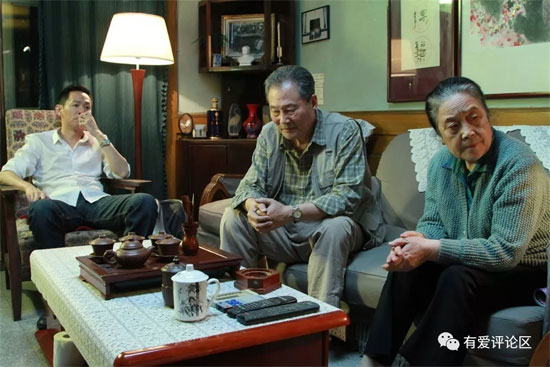
A father who doesn’t love his daughter wouldn’t go out of his way to make her happy; Grandpa, though he gave his granddaughter a random name, shielded her at every turn and even went out to persuade his dog-searching granddaughter to come home; Grandma initially opposed keeping a dog but tolerated it for her granddaughter’s sake, later venturing out to search for her when she didn’t return home late at night. Even the stepmother devised ways to “bring good fortune” by buying roller skates and “compensate” with a new dog…
The problem lies in their perception of Li Wan as merely a “tantrum-throwing” child, resorting solely to “soothing” as their solution.
“Haven’t we done enough for you? Didn’t we all go through this? I didn’t have nearly as much as you did when I was little.” The adults had long forgotten their own ‘childish’ obsessions, like insisting “it’s not Einstein.”
03
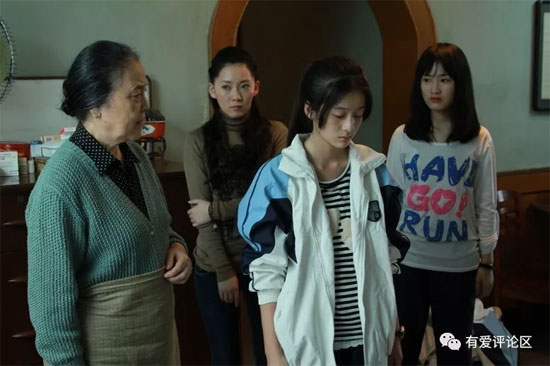
Cousin Li Tang is actually a very representative example: though only slightly older than Li Wan, she possessed a maturity beyond her years. This allowed her to understand and support her younger sister’s persistence, yet also know when to back down under the adults’ disapproving glances.
Adults could tolerate a child’s “unreasonable tantrums,” but they couldn’t endure them indefinitely. If Li Wan didn’t calm down, she’d be labeled “unreasonable.” The issue could easily shift to “Is a dog more important than you, you little brat?” So Grandpa, abandoning his usual kind demeanor, harshly scolded his granddaughter, while Father even hit his daughter for nearly “causing trouble.”
Afterward, the father was filled with regret. He spoke earnestly to his wounded daughter, hoping she would understand the hardships and difficulties adults face. He urged her to be “obedient,” to be sensible, to know when to back down, and to learn to “grow up.”
04
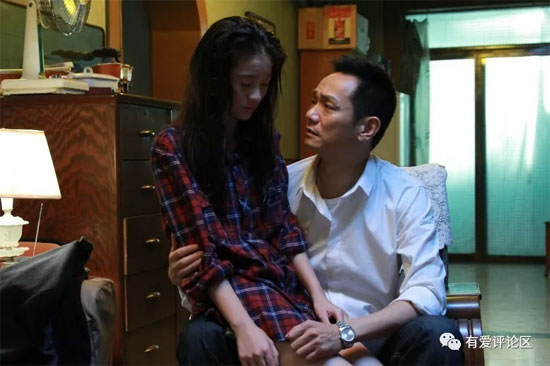
The phrase “We’re only doing this for your own good” encapsulates all educational principles. Compared to children’s wild imaginings, adults prefer their offspring to live up to their expectations—to understand the rules of the adult world and abandon their fantasies…
Later, the father rejoiced for his daughter because Li Wan scored 95 on her English exam; it didn’t matter that her English speech went awry, because Li Wan secured early admission to high school by winning first place in the physics competition—had it not been for this unexpected windfall that aligned with the father’s utilitarian mindset, he would surely have shown his daughter a different face.
By comparison, Li Wan’s discovery on Li Zhaozhao’s birthday that she had a younger brother seemed almost trivial.
05
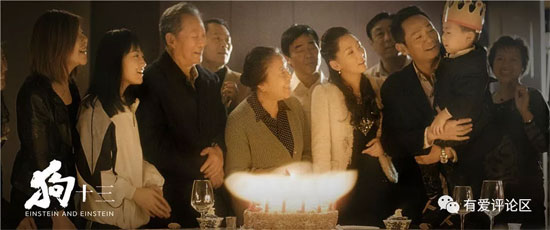
Faced with the family’s deception and abandonment, Li Wan didn’t erupt in fury like last time, embarrassing everyone. Instead, she forced a smile and joined in wishing her brother a happy birthday… Yet she hadn’t mastered the adults’ worldly wisdom and hypocrisy. Unable to shake the torment of feeling like “the festivities belong to them, not me,” she soon couldn’t hold it together. Sitting alone, she succumbed to self-pity.
In the film’s early stages, Li Wan still possessed abundant emotion and fiery passion. Yet by the middle and end, these feelings gradually faded until they vanished entirely—for the most vital driving force in her heart had vanished: hope.
“If you don’t hope, you won’t be disappointed.” This elusive state of mind could be glimpsed in her expression.
06
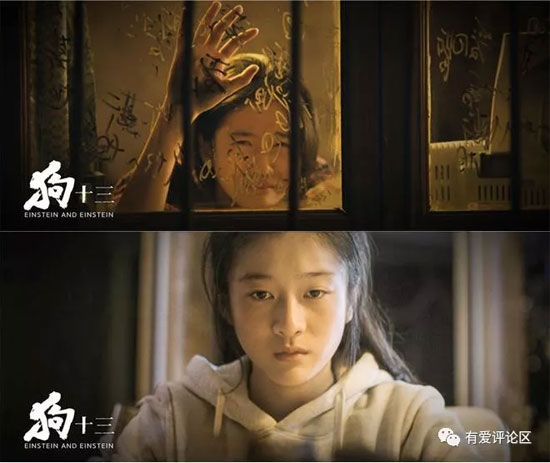
At first, Li Wan wears her heart on her sleeve—loving fiercely, hating passionately, her emotions written across her face. But after the “Einstein incident” concludes, her failed trip to the planetarium, and her brother’s reappearance in her life, she gradually becomes expressionless. Only at the very end does she learn to say “thank you” to her father outside the stray dog shelter, take a bite of dog meat at the dinner table, and put on a polite smile.
How Li Wan herself perceived this transformation remains unknown, but to many adults, it clearly signaled a child’s “maturity, understanding, and growing up.”
For a long time, the “parallel universe” theory underpinned Li Wan’s “innocent stubbornness.” She believed that in another universe, another version of herself could live happily and contentedly—in a sense, she was within arm’s reach of this “truth,” for upstairs lived that “unwilling-to-change” self.
07
Li Wan had always assumed the upstairs neighbors kept birds. Though she couldn’t explain why so many different bird calls echoed through the apartment, she clung to the belief that “hearing is believing”… until she discovered all those bird calls actually came from a crazy, oversized baby wearing the three-stripe insignia of a student cadre.
This was the most surreal moment in the entire “Einstein & Einstein.” Li Wan understood/accepted her fate: either shatter her world and grow through excruciating pain, or wrap herself tightly in isolation and be abandoned by the outside world… It was either progress or death.
Speaking of which, I must mention her sister Li Tang once more. She not only complements and highlights Li Wan’s character but also represents her continuation and expansion in another dimension.
08
Li Tang initially moved in to tutor Li Wan in English. Through her, Li Wan first encountered rollerblading, early romance, sexual awakening, compromise, and even the unrecognized cycles of falling out and reconciling.
Li Tang proved far more “worldly” than her sister. Her journey from muddled “liking” to effortlessly ending things with her boyfriend Gao Fang in just four sentences revealed how swiftly she matured—and precisely why the sisters’ contrasting attitudes toward their first Einstein became so starkly evident in the finale: While Li Tang had long learned to compromise and conform, she still held onto a stubborn core of her original self. Li Wan, however, after failing to resist and ceasing her struggles, abandoned her past entirely through transformation and assimilation.
“There’ll be plenty more of this kind of thing in the future,” Li Tang once said. When these words later came from Li Wan’s mouth, they carried a deeper weight.
“Growing up” is a neutral term, while “acting like an adult” often carries more futility and resignation.
09
Though the father often appears as the antagonist in the film, was he truly unaware of his daughter’s thoughts and desires? Of course not—it’s just that, rather than listening and accommodating, he was more accustomed to resolving his daughter’s emotional issues through paternal authority and logic. In the adult world, there are unspoken rules, and the weight of responsibility and pressure left him no time or energy to connect with his daughter. His own similar upbringing made him even more uncertain about how to enter her inner world.
When Li Wan asks, “How did you and Mom start dating?” her father can only futilely try to hide his tears from her. He always hoped his daughter would “grow up” quickly, but when that wish finally came true, he saw in her gradually fading eyes the same prematurely stifled self he once was.
In truth, compared to Li Wan’s bluntness that spares no elder’s feelings, the “milk” in Einstein & Einstein better reflects the film’s thematic spirit.
Li Wan clearly suffers from lactose intolerance, though others either don’t understand, forget, or simply don’t know this: The first time, Grandma wanted her to gain weight, but Li Wan vomited immediately after drinking it. The second time, Dad told her to drink milk instead of wine, but Li Wan swapped it for wine. The third time, Gao Fang tried to comfort her with milk, but Li Wan stubbornly downed it—only to vomit again afterward…
10
From a resolute refusal to a quiet resistance, and finally to a reluctant acceptance, Li Wan navigated this unwilling yet unavoidable transformation, completing her rite of passage.
The last time milk appears in the film is during a scene where Li Wan accompanies her younger brother to ice skating lessons. Li Zhaozhao, who also suffers from lactose intolerance, is forced by the coach’s stern gaze to take sip after sip.
When Li Wan witnessed her brother learning to skate while crying over his “lost privilege,” she smiled faintly: Zhaozhao was indeed far happier than she was—celebrating birthdays, eating cake, receiving the family affection and care she dared not dream of… But one day, he too would experience the inevitable disappointments and injustices, bear the unavoidable helplessness and loneliness, “grow up,” and understand the truths of adulthood.
The catalyst for all this might be Einstein, the only one at home who defies her “authority”; it might be the strict coach at the ice rink; or it could be any unexpected person or event.
11
This is a film whose core message is so powerful it renders technical analysis unnecessary. I feel fortunate to have witnessed it.
Every viewer of “Einstein & Einstein” should find resonance here. If not, what a blissfully fortunate soul they must be… I don’t doubt that such a child of heaven, showered with boundless affection and privilege, exists in this world. But I doubt it’s you or me.
Please specify:Anime Phone Cases » Einstein & Einstein 狗十三 2013 Film Review: When you grow up, you’ll understand.